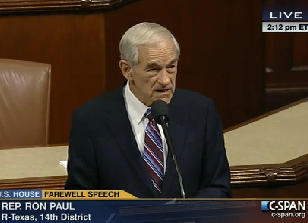There are a fair few issues over which I would heartily disagree with longtime Rep. Ron Paul, but there are also a heck of a lot on which I most vociferously would agree: Limited government, sticking to the Constitution, federalism, free markets, fiscal solvency, classical liberalism, free speech; he knows how to talk a great game on that front. His stubbornly-lingering presidential bid may’ve earned him some ire, and his steadfast libertarianism has managed to garner him a rather — er — shall we say boisterous following, but I wonder if any recent politician has made such a successful career out of sticking to his guns rather than adapting to the political moment; constancy seems to be quite the feat for too many of our elected leaders.
Paul made his farewell speech to the House of Representatives on Wednesday afternoon, as he’ll be retiring at the close of this Congress, and I thought his speech was a good summation of his career and provided some excellent food for thought. Again, I’m not on board with everything he has to say, but he did pose a poignant question of sorts that a lot of conservatives have been pondering in the wake of Mitt Romney’s defeat: “I’ve thought a lot about why those of us who believe in liberty as a solution, have done so poorly in convincing others of its benefits. If liberty is what we claim it is, the principle that protects all personal, social, and economic decisions necessary for maximum prosperity and the best chance for peace, it should be an easy sell. Yet history has shown that the masses have been quite receptive to the promises of authoritarians, which are rarely, if ever, fulfilled. Should we have authoritarianism, or liberty?” Selling the conservative vision of freedom as the most effective, penetrating way to help people, and as the pro-market rather than the pro-business party, does seem to be quite the sticking point, doesn’t it? Click the image to watch:









Join the conversation as a VIP Member